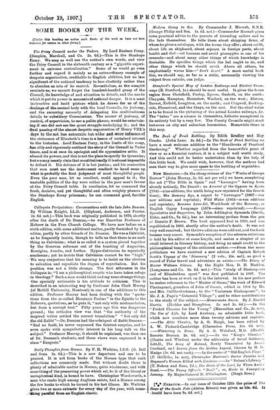SOME BOOKS OF THE WEEK.
, [Under this heading we notice such Books of the week as have not been ereserved for review in other forns.1
The Privy Council under the Tudors. By Lord Eustace Percy. (Simplin, Marshall, and Co. 2s. 6d.)—This is the Stanhope - Essay. We may as well use the author's own words, and view the Privy Council in the sixteenth century as a "gigantic experi- ment in extreme centralisation." Some of us would go even further and regard it mainly as an extraordinary example of despotic organisation, creditable to English abilities, but no less significant of the national tendency to lose elasticity rather than to abandon an iota of its control. Nevertheless, as the esaayist remindfrue, we-cannot forget the -hundred-handed grasp of the Council, its knowledge of and attention to details, and the usedo which it put its power in moments of national danger. It is a most instructive and lucid - picture which he draws for us of the • dealiage- of. the.e,entral body with the local Councils, its jealousy, and the recurring necessity of -delegating the _multitudinous details to- subsidiary- Cominieeiens. The seesaw of jealousy, of control,. of aupervision,. to.use a polite phrase, woultijne entertain- ing if one did 'not see-the -great struggle ;undeelyiag it ; and the .1nal passing,of the almost, despotic organisation tit Henry days to the not less autocratic.- but eider And bwiser lailitence the statesmen of Elizabeth's timmis a lesson of sustained interest to. the historian. ;.LordEustaoe Percy, in the limits of the essay, ..has ably and vigorously outlined the story of the Oonneilin Tudor :times, and is at once its apologist and tits appreciative antic. It abused its powers; and this is not the place to specify its tyrannies; but w e may merely state that eonatitutionally it isalmost impossible to defend it. His defence of it is but justice ; and his contention that men must use the instrunient - readiest,tm -hand sums up what is probably the final 'judgment of most thoughtful people Even the poor man, let us recollect, could appeal to it; the -unstable politics of the day were rather in the poor man's favour at the Privy Council table. In conclusion, let us commend the fresh, decisive, and yet thoughtful and often weighty phrases of the Stanhope Essay prizeman; he can command good, forcible English.










































 Previous page
Previous page